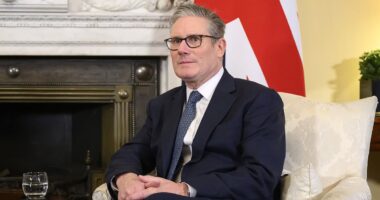Almost half of people in their fifties are experiencing sleeping difficulties, a survey has found.
The study showed that 46 per cent of people aged 50 to 59 reported that they have not been sleeping well during the last 12 months, while 42 per cent said they were more anxious over the same timeframe.
Researchers at Kantar Research Express, commissioned by charity Age UK, spoke to 2,621 people over the age of 50 and also uncovered a looming crisis in older people’s mental health.
As many as one in eight people aged 50 and over said they rarely or never had social contact with others in person, over the phone or online.
Other findings included over a third of 50 to 59-year-olds reported finding it harder to remember things, while a quarter (26 per cent) said they were finding it harder to process new information.

The study showed that 46 per cent of people aged 50 to 59 reported that they have not been sleeping well during the last 12 months (Stock Image)
Almost half (48 per cent) of unpaid carers aged 50 or over said they had felt anxious in the past year, with more than a third (34 per cent) reporting they felt overwhelmed and over a fifth (21 per cent) felt lonely due to the care or support they were responsible for.
Caroline Abrahams, Age UK director, said the findings demonstrated the gap between the provision of mental health support and demand for help.
She said: ‘It’s sobering to see how common mental ill-health and an absence of wellbeing is among our older population.
‘Our research is a reminder of the big gap that exists at the moment between the need for mental health support of all kinds, including talking therapies, and its availability.
‘The fact that our research found that people in their fifties are often struggling with their mental health too will be a surprise to many I think, and it’s an important wake up call for the NHS and our society.
‘Across the UK there are some eight million people aged 50-something, but their needs are generally overlooked.
‘It is often simply assumed that they are universally happy, hale and hearty, but our research paints a rather different picture.’
The findings come after a report last week by the Centre for Mental Health found older people were being left behind by inadequate mental health services, ageism, and the absence of a national strategy.
Anxieties are not limited to physical or mental health conditions, either.
Last month older people’s financial hardship charity Independent Age published figures which showed 41 per cent of people aged 50 or over and not fully retired were concerned about economic hardship in their retirement.
The research also showed nearly a fifth (18 per cent) of people between 60-64 approaching retirement were living in deep poverty.









